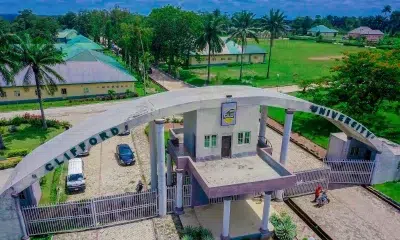courses
All Courses Offered in Nigerian Universities and their Duration
Here is a complete list of all courses offered in Nigerian Universities together with their overview, duration and admission requirements.
Courses offered in Nigerian Universities – Are you considering pursuing higher education in Nigeria? Look no further! Nigerian universities offer a wide range of courses to cater to various interests and career aspirations.
Whether you’re passionate about engineering, medicine, humanities, or social sciences, Nigerian universities have something for everyone.
In this article, we will explore the diverse array of courses offered in Nigerian universities, providing you with valuable insights into the academic opportunities available. So, let’s dive in and discover the vast educational landscape of Nigeria!
Courses Offered in Nigerian Universities
Nigerian universities boast an impressive repertoire of courses, ensuring that students have ample choices to pursue their desired career paths. Here are some of the prominent fields of study available in Nigerian universities:
1. Engineering
Engineering is a field that encompasses the application of scientific and mathematical principles to design, construct, and innovate across various industries.
Nigerian universities offer a wide range of engineering courses, equipping students with the skills and knowledge necessary to tackle complex technological challenges and contribute to the development of the nation.
Engineering courses in Nigerian universities provide students with a solid foundation in various branches, including civil engineering, electrical engineering, mechanical engineering, and chemical engineering.
Click here: List of All Engineering Courses offered in Nigerian Universities
2. Medicine
Medicine is a noble and esteemed profession that focuses on the diagnosis, treatment, and prevention of diseases, as well as the overall well-being of individuals.
Nigerian universities offer comprehensive medical programs that equip aspiring doctors, nurses, and healthcare professionals with the knowledge and skills necessary to provide quality healthcare to the nation’s population.
Click here: List of All Medicine Courses Offered in Nigerian Universities
3. Law
Nigerian universities are renowned for their reputable law schools. The field of law is a dynamic and multifaceted discipline that encompasses various areas of specialization.
Nigerian universities offer comprehensive law courses that equip aspiring lawyers with the necessary knowledge and skills to navigate the complexities of the legal profession.
Whether you aspire to be a corporate lawyer, criminal defense attorney, or constitutional law expert, Nigerian universities provide a wide range of law courses to cater to diverse interests.
Click here: List of All Law Courses Offered in Nigerian Universities
4. Business Administration
If you have an entrepreneurial spirit and a passion for business, Nigerian universities offer excellent business administration programs.
The field of business administration is a versatile and dynamic discipline that equips individuals with the skills and knowledge to navigate the complexities of the business world.
Nigerian universities provide a wide range of business administration courses, these courses cover essential subjects like finance, marketing, human resources, and management, preparing students for leadership roles in various industries.
Click here: List of All Business Administration Courses Offered in Nigerian Universities
5. Computer Science
In today’s digital age, computer science and technology have become integral parts of our lives, driving innovation, efficiency, and progress across various industries.
Nigerian universities recognize the importance of computer education and offer a wide range of computer courses to equip students with the knowledge and skills needed to thrive in the technology-driven world.
Whether you aspire to become a software developer, data scientist, cybersecurity expert, or IT professional, Nigerian universities provide comprehensive computer courses that pave the way for exciting career opportunities.
Click here: List of All Computer Courses Offered in Nigerian Universities
6. Accounting and Finance
The field of accounting and finance plays a crucial role in ensuring the financial health and success of an organizations.
Nigerian universities recognize the significance of accounting and finance and offer a diverse range of courses to equip students with the knowledge and skills needed to excel in these fields.
Whether you aspire to become a certified accountant, financial analyst, auditor, or investment banker, Nigerian universities offer courses that train students in financial management, auditing, taxation, and financial reporting. These courses lay the foundation for a successful career in finance and accounting.
Click here: List of All Accounting and Finance Courses Offered in Nigerian Universities
7. Social Sciences
The social sciences encompass a diverse range of disciplines that aim to understand and analyze various aspects of human society, behavior, and interactions. Nigerian universities recognize the importance of social sciences in providing insights into societal issues, shaping public policies, and fostering social change.
As a result, they offer a wide array of social sciences courses that provide students with a comprehensive understanding of human behavior, societal structures, and the complexities of the world we live in.
Whether you are interested in psychology, sociology, political science, economics, or anthropology, Nigerian universities provide a rich educational landscape for those passionate about the social sciences.
Click here: List of All Social Sciences Courses Offered in Nigerian Universities
8. Mass Communication
Mass communication is a dynamic and influential field that encompasses various forms of media and communication channels.
Nigerian universities offer comprehensive mass communication programs that equip students with the skills and knowledge to navigate the ever-evolving world of media and communication.
Whether you aspire to be a journalist, a public relations specialist, or a broadcasting professional, Nigerian universities provide a wide range of mass communication courses to cater to diverse interests.
Click here: List of All Mass Communication Courses offered in Nigerian Universities
9. Agriculture
Agriculture plays a vital role in Nigeria’s economy, providing food security, employment opportunities, and sustainable development.
Nigerian universities offer comprehensive agricultural programs that equip students with the knowledge and skills to contribute to the agricultural sector.
Whether you aspire to be an agricultural scientist, a farm manager, or an agricultural economist, Nigerian universities provide a wide range of agricultural courses to cater to diverse interests.
Click here: List of All Agricultural Courses Offered in Nigerian Universities
10. Education
Education is the key to personal growth, societal progress, and the development of a nation.
Nigerian universities offer comprehensive education programs that equip students with the knowledge and skills to become effective educators, administrators, and advocates for quality education.
Whether you aspire to be a teacher, an educational psychologist, or an educational policy expert, Nigerian universities provide a wide range of education courses to cater to diverse interests.
Click here: List of All Education Courses Offered in Nigerian Universities
11. Art
The art department in Nigeria offers courses that provide a strong basis for individuals seeking to pursue professions in fields such as entertainment, public relations, international affairs, and other related industries.
Given that a vast majority of tertiary education institutions across the nation have a department dedicated to fine and applied arts, it is probable that several schools provide identical courses at varying costs.
Click here: List of All Art Courses Offered in Nigerian Universities
12. Science
If you studied science subjects in your secondary school, chances are you want to process to study a science course offered in the University.
When discussing science, it is a basic concept that encompasses many aspects of existence. It is a straightforward study of both living and non-living things in our surroundings.
This simple definition became the foundation for many branches of life. Science, according to some, is the study of what happens in the environment and how it impacts life.
Science, to some, is just a course of study that takes you on an adventure of what you see around you and the study of living processes.
Science is divided into three categories: physical sciences, chemical sciences, and biological sciences.
Click here: List of All Science Courses Offered in Nigerian Universities
List of Courses Offered in Nigerian Universities
Nigerian universities boast an impressive repertoire of courses, ensuring that students have ample choices to pursue their desired career paths.
Here is a list of all courses offered in Nigerian Universities and their duration.
Feel free to click on any of the courses listed below for a full overview of what the course entails, Jamb requirements, O’level combination and admission requirements to study the course in a Nigerian University.
Courses/Departments |
Duration |
| Accounting | Four (4) years |
| Accountancy/Finance/Accounting | Four (4) years |
| Accounting Management and Finance | Four (4) years |
| Actuarial Science | Four (4) years |
| Adult Education | Four (4) years |
| Adult Education/English Literature | Four (4) years |
| Adult Education/Economics and Statistics | Four (4) years |
| Adult and Community Education | Four (4) years |
| Adult Education and Non-Formal Education | Four (4) years |
| Adult Education/Political Science and Public Administration | Four (4) years |
| Adult Education/Geography and Regional Planning | Four (4) years |
| Aeronautic and Aerospace Engineering | Four (4) years |
| Agribusiness | Five (5) years |
| Afik-Ibibio | Four (4) years |
| Agriculture | Five (5) years |
| Agricultural Education | Four (4) years |
| Agricultural Economics | Five (5) years |
| Agricultural Economics and Farm Management | Five (5) years |
| Agricultural Administration | Five (5) years |
| Agricultural Engineering | Five (5) years |
| Agricultural and Environmental Engineering | Five (5) years |
| Agricultural and Bio-Resources Engineering | Five (5) years |
| Agricultural Economics and Extension | Five (5) years |
| Agricultural Extension and Rural Sociology | Five (5) years |
| Agricultural Extension and Management | Five (5) years |
| Agricultural Extension | Five (5) years |
| Agricultural Extension Service | Five (5) years |
| Agricultural Extension and Rural Development | Five (5) years |
| Agricultural Extension and Communication Technology | Five (5) years |
| Agricultural Extension and Social Engineering | Five (5) years |
| Agronomy | Five (5) years |
| Anatomy | Four (4) years |
| Animal and Environmental Biology | Four (4) years |
| Animal Biology and Environment | Four (4) years |
| Animal Science | Five (5) years |
| Animal Science and Fisheries Management | Five (5) years |
| Animal Science and Fisheries | Five (5) years |
| Animal Production | Five (5) years |
| Animal Production and Fisheries | Five (5) years |
| Animal Production and Health | Five (5) years |
| Animal Production and Health Services | Five (5) years |
| Animal Nutrition | Five (5) years |
| Animal Nutrition and Biotechnology | Five (5) years |
| Animal Science and Range Management | Five (5) years |
| Animal Science and Technology | Five (5) years |
| Animal Physiology | Five (5) years |
| Animal Breeding and Genetics | Five (5) years |
| African and Asian Studies | Four (4) years |
| Arabic Studies | Four (4) years |
| Arabic and Islamic Studies | Four (4) years |
| Arabic Language and Literature | Four (4) years |
| Archaeology | Four (4) years |
| Architecture | Five (5) years |
| Arts | Four (4) years |
| Art and Design | Four (4) years |
| Arts and Social Science Education | Four (4) years |
| Arts Education | Four (4) years |
| Anthropology | Four (4) years |
| Applied Biochemistry | Four (4) years |
| Applied Biology | Four (4) years |
| Applied Biology and Biotechnology | Four (4) years |
| Applied Biology and Genetics | Four (4) years |
| Applied Botany | Four (4) years |
| Applied Chemistry | Four (4) years |
| Applied Ecology | Four (4) years |
| Applied Geology | Four (4) years |
| Applied Geophysics | Four (4) years |
| Applied Mathematics and Statistics | Four (4) years |
| Applied Microbiology | Four (4) years |
| Applied Microbiology and Brewing | Four (4) years |
| Applied Statistics | Four (4) years |
| Applied Physics | Four (4) years |
| Applied Zoology | Four (4) years |
| Automobile Technology Education | Four (4) years |
| Banking and Finance | Four (4) years |
| Biochemistry | Four (4) years |
| Biochemistry and Molecular Biology | Four (4) years |
| Bioinformatics | Four (4) years |
| Biology | Four (4) years |
| Biology/Biotechnology | Four (4) years |
| Biological Science(s) | Four (4) years |
| Biostatistics | Four (4) years |
| Biotechnology | Four (4) years |
| Biomedical Engineering | Five (5) years |
| Botany | Four (4) years |
| Botany and Ecological Studies | Four (4) years |
| Building | Five (5) years |
| Building and Construction Technology | Five (5) years |
| Building Education | Four (4) years |
| Building Technology | Four (4) years |
| Business Administration | Four (4) years |
| Business and Entrepreneural Studies | Four (4) years |
| Business Education | Four (4) years |
| Business Management | Four (4) years |
| Business Mangement/Mangement Sciences | Four (4) years |
| Business Economics | Four (4) years |
| Cell Biology and Genetics | Four (4) years |
| Chemical Engineering | Five (5) years |
| Chemical Sciences | Four (4) years |
| Chemistry | Four (4) years |
| Chemistry and Industrial Chemistry | Four (4) years |
| Chinese | Four (4) years |
| Christian Religious Knowledge | Four (4) years |
| Christian Studies | Four (4) years |
| Civil Engineering | Five (5) years |
| Civil Law | Five (5) years |
| Classical Studies | Four (4) years |
| Commerce | Four (4) years |
| Common Law | Five (5) years |
| Common and Islamic Law | Five (5) years |
| Communication Arts | Four (4) years |
| Communication and Language Arts | Four (4) years |
| Community Development | Four (4) years |
| Communication and Multimedia Advertising | Four (4) years |
| Communication and Multimedia Printing Journalism | Four (4) years |
| Communication and Multimedia Television/Filming | Four (4) years |
| Communication and Multimedia Design | Four (4) years |
| Communication Technology | Four (4) years |
| Communication and Wireless Technology | Four (4) years |
| Comparative Religious Studies | Four (4) years |
| Computer Education | Four (4) years |
| Computer Science | Four (4) years |
| Computer Science and Mathematics | Four (4) years |
| Computer Engineering | Five (5) years |
| Computer Science and Information Technology (IT) | Five (5) years |
| Computer and Information Science | Four (4) years |
| Computer, Information and Communication Science | Four (4) years |
| Computer Science with Economics | Four (4) years |
| Computer Science and Engineering | Five (5) years |
| Computer Science and Informatics | Four (4) years |
| Computer with Electronics | Four (4) years |
| Computer with Statistics | Four (4) years |
| Conversation Biology | Four (4) years |
| Cooperative Economics and Management | Four (4) years |
| Counselling and Psychology | Four (4) years |
| Creative Arts | Four (4) years |
| Criminology | Four (4) years |
| Criminology and Security Studies | Four (4) years |
| Criminology and Penology | Four (4) years |
| Crop Science | Five (5) years |
| Crop Production | Five (5) years |
| Crop Production and Soil Science | Five (5) years |
| Crop Production Technology | Five (5) years |
| Crop Science and Technology | Five (5) years |
| Crop, Soil and Pest Management | Five (5) years |
| Crop Production and Landscape Management | Five (5) years |
| Crop Production and Horticulture | Five (5) years |
| Crop Production and Protection | Five (5) years |
| Crop Protection | Five (5) years |
| Crop Science/Soil Science | Five (5) years |
| Crop Science and Horticulture | Five (5) years |
| Crop and Environmental Protection | Five (5) years |
| Curriculum and Instruction | Four (4) years |
| Curriculum and Teaching | Four (4) years |
| Curriculum Studies | Four (4) years |
| Cyber Computer Science | Four (4) years |
| Cyber and IT Security | Four (4) years |
| Cyber Security Science | Four (4) years |
| Cyber Security | Four (4) years |
| Data Management | Four (4) years |
| Demography and Social Statistics | Four (4) years |
| Dental Studies | Six (6) years |
| Dentistry and Dental Technology | Four (4) years |
| Development Studies | Four (4) years |
| Digital Entrepreneurship | Four (4) years |
| Disaster Management | Three (3) years |
| Drama, Dramatic Arts, Theatre Arts and Performing Arts | Four (4) years |
| Early Childhood Development Education (ECD) | Four (4) years |
| Earth Science | Four (4) years |
| Ecology | Four (4) years |
| Ecology and Environmental Studies | Four (4) years |
| Economics | Four (4) years |
| Economics and Development Studies | Four (4) years |
| Economics and Operation Research | Four (4) years |
| Economics and Statistics | Four (4) years |
| Economics/Geography | Four (4) years |
| Educational Administration | Four (4) years |
| Education Administration and Supervision | Four (4) years |
| Education and Business Administration | Four (4) years |
| Education and Computer Science | Four (4) years |
| Education/Arabic | Four (4) years |
| Education/Arts | Four (4) years |
| Education/Arts and Social Sciences | Four (4) years |
| Education/Arts and Social Sciences | Four (4) years |
| Education/Christian Religious Studies | Four (4) years |
| Education/Edo Language | Four (4) years |
| Education/English Language | Four (4) years |
| Education Electrical and Electronics Engineering | Five (5) years |
| Education/Fine and Applied Arts | Four (4) years |
| Education Foundation and Administration | Four (4) years |
| Educational Foundation | Four (4) years |
| Education Foundation and Management | Four (4) years |
| Education/Chemistry | Four (4) years |
| Education/Geography | Four (4) years |
| Education/Hausa | Four (4) years |
| Education/History | Four (4) years |
| Education/French | Four (4) years |
| Education/Igbo | Four (4) years |
| Education/Islamic Studies | Four (4) years |
| Education/Igbo/Linguistics | Four (4) years |
| Education/Language Arts | Four (4) years |
| Education/Language and French | Four (4) years |
| Education/Language/English | Four (4) years |
| Education/Linguistics | Four (4) years |
| Education/Political Science | Four (4) years |
| Education Psychology, Guidance and Counselling | Four (4) years |
| Education/Social Science | Four (4) years |
| Education/Social Studies | Four (4) years |
| Education/Sociology | Four (4) years |
| Education/Accountancy | Four (4) years |
| Education Management | Four (4) years |
| Education/Mathematics | Four (4) years |
| Education and Music | Four (4) years |
| Education and Religious Studies | Four (4) years |
| Education/Technology/Introductory Education | Four (4) years |
| Education and Yoruba | Four (4) years |
| Education/Science | Four (4) years |
| Education/Integrated Science Education/Physics | Four (4) years |
| Electrons | Four (4) years |
| Electronics | Four (4) years |
| Electronics and Computer Technology | Four (4) years |
| Electronics Engineering | Five (5) years |
| Electrical Engineering | Five (5) years |
| Electrical/Electronic Technology | Four (4) years |
| Energy and Petroleum Resources | Four (4) years |
| Energy Studies | Four (4) years |
| Engineering Physics | Four (4) years |
| English Studies | Four (4) years |
| English Language | Four (4) years |
| English and International Studies | Four (4) years |
| English Language and Literature | Four (4) years |
| English and Literary Studies | Four (4) years |
| Entrepreneurship | Four (4) years |
| Entrepreneural Studies | Four (4) years |
| Entrepreneurship Studies and innovation | Four (4) years |
| Environemtal Biology | Four (4) years |
| Environmental Biology and Fisheries | Four (4) years |
| Environmental Health Science | Four (4) years |
| Environmental Protection and Resources Management | Four (4) years |
| Enviromental Sciences | Five (5) years |
| Environmental Science and Technology | Four (4) years |
| Environmental Engineering | Five (5) years |
| Environmental Management | Four (4) years |
| Environmental Technology | Four (4) years |
| Environmental Management Technology | Four (4) years |
| Estate Management | Four (4) years |
| Fashion and Interior Design | Four (4) years |
| Film Productions | Four (4) years |
| Film and Video Studies | Four (4) years |
| Finance | Four (4) years |
| Fine Arts | Four (4) years |
| Fine and Applied Arts | Four (4) years |
| Fisheries | Four (4) years |
| Fisheries and Aquaculture | Four (4) years |
| Fisheries Management | Five (5) years |
| Fisheries Technology | Five (5) years |
| Food Science and Technology | Four (4) years |
| Food Engineering | Five (5) years |
| Food Technology | Five (5) years |
| Food Science and Technology | Five (5) years |
| Food Science and Engineering | Five (5) years |
| Foreign Language and Literature | Four (4) years |
| Forensic Science | Four (4) years |
| Forest and Wildlife Management | Four (4) years |
| French | Four (4) years |
| French | Four (4) years |
| French and International Relations | Four (4) years |
| Fulah | Four (4) years |
| Gas Engineering | Five (5) years |
| Gender and Women’s Studies | Four (4) years |
| Genetics and Biotechnology | Four (4) years |
| Geoscience | Four (4) years |
| Geophysics | Four (4) years |
| Geography | Four (4) years |
| Geography and Geosciences | Four (4) years |
| Geography and Environmental Studies | Four (4) years |
| Geography and Environmental Management (Gem) | Four (4) years |
| Geography and Regional Planning | Four (4) years |
| Geography and Meteorology | Four (4) years |
| Geography and Planning | Four (4) years |
| Geology | Four (4) years |
| Geology and Geophysics | Four (4) years |
| Geological Sciences | Four (4) years |
| Geology and Mineral | Four (4) years |
| Geology and Mining | Four (4) years |
| Geology and Petroleum Resources | Four (4) years |
| German | Four (4) years |
| Hausa | Four (4) years |
| History | Four (4) years |
| History/International Studies | Four (4) years |
| History and Archeology | Four (4) years |
| History and Diplomacy | Four (4) years |
| History and Diplomatic Studies | Four (4) years |
| History and Strategic Studies | Four (4) years |
| History and Political Studies | Four (4) years |
| Home Economics Education | Four (4) years |
| Home Economics and Food Management | Four (4) years |
| Home Economics and Hotel Management | Four (4) years |
| Hospitality and Tourism Management | Four (4) years |
| Hotel and Tourism Management | Four (4) years |
| Human Biology | Four (4) years |
| Human Anatomy and Physiology | Four (4) years |
| Human Kinetics Education | Four (4) years |
| Human Kinetics and Health Education | Four (4) years |
| Human Nutrition and Dietetics | Four (4) years |
| Human Resources Management (HRM) | Four (4) years |
| Hydrology | Five (5) years |
| ICT Engineering | Five (5) years |
| Igbo | Four (4) years |
| Igbo/Linguistics | Four (4) years |
| Industrial and Labour Relations | Four (4) years |
| Industrial Arts | Four (4) years |
| Industrial and Environmental Chemistry | Four (4) years |
| Industrial Chemistry | Four (4) years |
| Industrial Chemistry and Chemical Entrepreneurship | Four (4) years |
| Industrial Design | Four (4) years |
| Industrial Mathematics | Four (4) years |
| Industrial Mathematics/Applied Statistics | Four (4) years |
| Industrial Mathematics/Computer | Four (4) years |
| Industrial Microbiology | Four (4) years |
| Industrial Relations and Personnel Management | Four (4) years |
| Industrial Production and Engineering | Five (5) years |
| Industrial Physics | Four (4) years |
| Industrial Physics and Renewable Energy | Four (4) years |
| Industrial Physics with Electronics and its Application | Four (4) years |
| Industrial Technical Education | Four (4) years |
| Information Science and Media Studies | Four (4) years |
| Information Media Technology | Four (4) years |
| Information Media Sciences | Four (4) years |
| Information Systems | Four (4) years |
| Information Communication Technology | Four (4) years |
| Information Technology | Four (4) years |
| Information Systems | Four (4) years |
| Information Systems and Technology | Four (4) years |
| Information and Communication Science | Four (4) years |
| Insurance | Four (4) years |
| Insurance and Risk Mangement | Four (4) years |
| Intelligence and Security Studies | Four (4) years |
| Intercultural Education | Four (4) years |
| International and Comparative Politics | Four (4) years |
| International Law and Jurisprudence | Five (5) years |
| International Relations | Four (4) years |
| International Relations and Diplomatic Studies | Four (4) years |
| International Studies and Diplomacy | Four (4) years |
| Information Technology | Five (5) years |
| Irrigation Engineering | Five (5) years |
| Islamic Law/Sharia Law | Five (5) years |
| Kanuri | Four (4) years |
| Kiswahili | Four (4) years |
| Laboratory Sciences | Five (5) years |
| Land Surveying | Five (5) years |
| Languages | Four (4) years |
| Languages Arts | Four (4) years |
| Language Arts and Yoruba | Four (4) years |
| Language and Linguistics | Four (4) years |
| Language and Literature | Four (4) years |
| Law | Five (5) years |
| Library and Information Science | Four (4) years |
| Library Science | Four (4) years |
| Library Studies | Four (4) years |
| Literature in English | Four (4) years |
| Livestock Production Technology | Five (5) years |
| Linguistics | Four (4) years |
| Linguistics/Edl | Four (4) years |
| Linguistics and Communication | Four (4) years |
| Linguistics/Yoruba | Four (4) years |
| Linguistics/Urhobo | Four (4) years |
| Local Government Administration | Four (4) years |
| Logistics and Transport Management | Four (4) years |
| Management and Entrepreneurship | Four (4) years |
| Management Information System | Four (4) years |
| Management Studies | Four (4) years |
| Management Technology | Five (5) years |
| Marketing | Four (4) years |
| Marketing and Advertising | Four (4) years |
| Marine Biology | Four (4) years |
| Marine Biology and Fisheries | Four (4) years |
| Marine Engineering | Five (5) years |
| Marine Geology | Four (4) years |
| Marine Management Technology | Five (5) years |
| Marine Science | Four (4) years |
| Marine Science and Technology | Four (4) years |
| Mass Communication | Four (4) years |
| Mass Communiation and Media Studies | Four (4) years |
| Mass Communication and Media Technology | Four (4) years |
| Materials Science and Engineering | Five (5) years |
| Materials and Production Engineering | Five (5) years |
| Mathematics | Four (4) years |
| Mathematics and Economics | Four (4) years |
| Mathematics with Computer Science | Four (4) years |
| Mathematics Education Technology | Four (4) years |
| Mathematics and Statistics | Four (4) years |
| Mathematics/Statistics Education | Four (4) years |
| Mathematical Sciences | Four (4) years |
| Mechanical Engineering | Five (5) years |
| Mechanical and Production Engineering | Five (5) years |
| Mechatronics Engineering | Five (5) years |
| Media and Communication Studies | Four (4) years |
| Medical Biochemistry | Four (4) years |
| Medical and Health Sciences | Five (5) years |
| Medical Laboratory Technology/Science | Five (5) years |
| Medical Rehabilitation | Five (5) years |
| Medicine and Surgery (Human Medicine) | Six (6) years |
| Metallurgical Engineering | Five (5) years |
| Metallurgical & Material Engineering | Five (5) years |
| Metal Technology Education | Four (4) years |
| Meteorology | Five (5) years |
| Microbiology | Four (4) years |
| Microbiology and Biotechnology | Four (4) years |
| Microbiology and Industrial Biotechnology | Four (4) years |
| Microbiology/Parasitology | Four (4) years |
| Mining Engineering | Five (5) years |
| Modern European Languages | Four (4) years |
| Modern Language and Translation | Four (4) years |
| Molecular Biology | Four (4) years |
| Music | Four (4) years |
| Natural and Environmental Health Science | Four (4) years |
| Natural Resources Mangement | Four (4) years |
| Naval Architecture | Four (4) years |
| Nigerian Languages | Four (4) years |
| Nursing | Five (5) years |
| Nursing/Nursing Science | Five (5) years |
| Nutrition and Dietetics | Five (5) years |
| Nursery and Primary Education | Four (4) years |
| Office Administration and Management | Four (4) years |
| Oceanography | Four (4) years |
| Office and Information Mangement | Four (4) years |
| Operational Research | Four (4) years |
| Optometry | Six (6) years |
| Pasture and Range Management | Five (5) years |
| Parasitology and Entomology | Four (4) years |
| Peace Studies | Four (4) years |
| Peace and Conflict Studies | Four (4) years |
| Peace Studies and Conflict Resolution | Four (4) years |
| Peace and Development Studies | Four (4) years |
| Performing Arts and Theatre | Four (4) years |
| Petrochemical Engineering | Five (5) years |
| Petroleum Engineering | Five (5) years |
| Petroleum Chemistry | Four (4) years |
| Petroleum and Gas Engineering | Five (5) years |
| Petroleum and Petro-Chemical Sciences | Four (4) years |
| Pharmacy | Five (5) years |
| Pharmacology | Four (4) years |
| Pharmaceutical Science and Technology | Five (5) years |
| Policy and Administrative Studies | Four (4) years |
| Policy and Strategic Studies | Four (4) years |
| Political Science | Four (4) years |
| Political Science and Administrative Studies | Four (4) years |
| Political Science and Conflict Resolution | Four (4) years |
| Political Science and Defense Studies | Four (4) years |
| Political Science and Diplomacy | Four (4) years |
| Political Science and International Relations | Four (4) years |
| Political Science/International Law and Diplomacy | Four (4) years |
| Population Studies | Four (4) years |
| Philosophy | Four (4) years |
| Philosophy and Religious Studies | Four (4) years |
| Physics | Four (4) years |
| Physics/Astrology | Four (4) years |
| Physics/Industrial Physics | Four (4) years |
| Physics and Applied Physics | Four (4) years |
| Physics and Computer Electronic | Four (4) years |
| Physics and Electronics | Four (4) years |
| Physics and Solar Energy | Four (4) years |
| Physics and Energy Studies | Four (4) years |
| Physics with Computational Modeling | Four (4) years |
| Physical and Health Education | Four (4) years |
| Physical Education | Four (4) years |
| Physical Sciences | Four (4) years |
| Physical Education and Recreation | Four (4) years |
| Physiology | Four (4) years |
| Physiotherapy | Five (5) years |
| Plant Breeding and Seed Technology | Five (5) years |
| Plant Biology | Four (4) years |
| Plant Biology and Biotechnology | Four (4) years |
| Plant Science | Four (4) years |
| Plant Science and Biotechnology | Four (4) years |
| Plant Science and Forestry | Four (4) years |
| Plant Science and Microbiology | Four (4) years |
| Polymer and Textile Engineering | Five (5) years |
| Political Science | Four (4) years |
| Portuguese | Four (4) years |
| Portuguese/English | Four (4) years |
| Pre-Primary Education | Four (4) years |
| Primary Education | Four (4) years |
| Private and Islamic Law | Five (5) years |
| Production Engineering | Five (5) years |
| Project Management | Four (4) years |
| Project Management Technology | Four (4) years |
| Prosthesis and Orthopedic Technology | Four (4) years |
| Psychology Education | Four (4) years |
| Psychology, Guidance and Counselling | Four (4) years |
| Psychology and Human Development | Four (4) years |
| Public Administration | Four (4) years |
| Public Administration and Local Government | Four (4) years |
| Public and Internationa Law | Five (5) years |
| Public Health | Four (4) years |
| Public Health Technology | Four (4) years |
| Public Relations and Advertising | Four (4) years |
| Pure and Applied Biology | Four (4) years |
| Pure and Applied Physics | Four (4) years |
| Pure and Applied Chemistry | Four (4) years |
| Pure and Industrial Chemistry | Four (4) years |
| Pure and Applied Mathematics | Four (4) years |
| Pure Chemistry | Four (4) years |
| Pure and Industrial Physics | Four (4) years |
| Pure Physics | Four (4) years |
| Philosophy Education | Four (4) years |
| Russian | Four (4) years |
| Quantity Surveying (QS) | Four (4) years |
| Radiography | Five (5) years |
| Religion and Philosophy | Four (4) years |
| Religion and Science | Four (4) years |
| Religious Studies | Four (4) years |
| Religious Studies/Theology | Four (4) years |
| Real Estate and Property Management | Four (4) years |
| Reproductive Health | Five (5) years |
| Secretarial Administration | Four (4) years |
| Secretarial Education | Four (4) years |
| Science and Computer Education | Four (4) years |
| Science and Engineering | Four (4) years |
| Science Education | Four (4) years |
| Science Laboratory Technology | Four (4) years |
| Social Justice | Four (4) years |
| Social Work | Four (4) years |
| Social Work and Community Development | Four (4) years |
| Sociology | Four (4) years |
| Sociology and Anthropology | Four (4) years |
| Software Engineering | Five (5) years |
| Software Engineering and Digital Entrepreneurship | Four (4) years |
| Soil Science | Four (4) years |
| Special Needs Education | Four (4) years |
| Sports Science | Four (4) years |
| Sport Management | Four (4) years |
| Supply Chain Mangement and Procurement | Four (4) years |
| Surveying | Five (5) years |
| Surveying and Geoinformatics | Five (5) years |
| Statistics | Four (4) years |
| Statistics and Data Sciences | Four (4) years |
| Systems Engineering | Five (5) years |
| Taxation | Four (4) years |
| Taxation and Event Mangement | Four (4) years |
| Technical Education | Four (4) years |
| Technology Education | Four (4) years |
| Technology and Vocation Education | Four (4) years |
| Teacher Education | Four (4) years |
| Telecommunication Engineering | Five (5) years |
| Telecommunication and Information Technology | Four (4) years |
| Telecommunication Management | Four (4) years |
| Telecommunication Science | Four (4) years |
| Technological Management | Four (4) years |
| Theatre Arts | Four (4) years |
| Theology | Four (4) years |
| Theology and Religious Studies | Four (4) years |
| Tourism Studies | Four (4) years |
| Tourism and Hospitality Management | Four (4) years |
| Transport Management | Four (4) years |
| Transportation and Management Technology | Four (4) years |
| Transport Planning and Management (TPM) | Four (4) years |
| Transport and Tourism | Four (4) years |
| Urban and Regional Planning | Five (5) years |
| Veterinary | Six (6) years |
| Veterinary Medicine | Six (6) years |
| Visual Arts technology | Four (4) years |
| Vocational Education | Four (4) years |
| Vocational Education and Technical Education | Four (4) years |
| Water Resources Management | Five (5) years |
| Yoruba | Four (4) years |
| Yoruba and Communication | Four (4) years |
| Zoology | Four (4) years |
| Zoology and Aquaculture | Four (4) years |
| Zoology and Environmental Biology | Four (4) years |
Importance of Higher Education in Nigeria
Higher education in Nigeria is more than just a steppingstone to a successful career; it’s an integral part of personal growth, skills development, and nation-building. With an array of courses offered across different fields, Nigerian universities aim to cater to the varied academic interests of their students.
Nigerian Universities
Nigerian universities can be broadly categorized into federal, state, and private universities, each with its unique characteristics and course offerings.
Also read: List of Nigerian Universities (Federal, State & Private Owned University)
Federal Universities and Their Courses
Federal universities, funded by the Nigerian government, offer a wide range of courses. From sciences to humanities, from law to engineering, federal universities serve as academic homes for diverse fields of study.
State Universities and Their Courses
State universities, on the other hand, are funded by state governments. They also offer an extensive range of courses, tailored to meet the demands of their individual states, yet still broadly appealing to a national audience.
Private Universities and Their Courses
Private universities, funded by individuals, corporate bodies or religious organizations, often offer specialized courses, with an emphasis on innovation, technology, and contemporary societal needs.
See this: Complete List of Private Universities in Nigeria (Recently Updated)
Role of The National Universities Commission (NUC)
The National Universities Commission plays a vital role in ensuring the quality of courses offered in Nigerian universities. The NUC accredits courses, ensuring they meet national and international standards.
Choosing the Right Course for You
Picking the right course in a Nigerian university can be challenging, but a careful analysis of your interests, strengths, and career goals can guide you to the perfect choice.
Factors to Consider When Choosing a Course
When choosing a course, consider your passion for the subject, the course’s relevance to your career aspirations, the course’s employability rate, and the course’s requirements.
- Interest and Passion: Choosing a course that you are genuinely interested in and passionate about will make your university experience much more enjoyable and fulfilling.
- Course Relevance: Consider whether the course is relevant to the current demands of society and the job market. Courses in high-demand sectors may offer better employment prospects.
- Academic Strengths: Your academic strengths should align with the course you want to pursue. If you are good in science subjects, courses in science-related fields may be suitable.
- Career Goals: Think about your long-term career goals. The course you choose should align with the career path you want to pursue.
- Course Content: Look at the curriculum for each course to understand what you will be learning. Ensure that it covers areas you are interested in.
- Admission Requirements: Be aware of the specific admission requirements for each course. Some courses may have more stringent requirements than others.
- Course Duration: Consider the length of the course. Some courses may take longer to complete than others.
- University Reputation: The reputation of the university in the specific course you want to study can be a determining factor.
- Financial Implications: Understand the costs involved, including tuition, accommodation, textbooks, etc. Choose a course that is financially viable for you and your family.
- Postgraduate Opportunities: If you’re interested in further studies, consider whether the course will allow you to pursue postgraduate studies in your desired field.
- Location: If the course you want to study is offered at a university far from home, you need to be prepared to adapt to a new environment.
- Teaching and Assessment Method: Some courses might have a more practical approach while others might be more theoretical. Choose based on your learning preference.
Remember, it’s crucial to take time and carry out thorough research before making your decision. This can have a significant impact on your future career and life.
Most Popular Courses in Nigerian Universities
Medicine, law, engineering, and business administration are among the most popular courses in Nigerian universities.
Reasons for Their Popularity
These courses are popular due to their high employability rate, societal prestige, and the potential for high earnings.
Future Courses to Watch out For
With the rise of artificial intelligence, data science, and renewable energy, courses in these fields are expected to rise in popularity.
Frequently Asked Questions on Courses Offered in Nigerian University
1. What courses are most popular in Nigerian universities?
Medicine, Law, Engineering, and Business Administration are among the most popular courses.
2.How does the NUC ensure the quality of courses?
The NUC accredits courses, ensuring they meet national and international standards.
3. Are there different types of universities in Nigeria?
Yes, there are federal, state, and private universities, each offering a range of courses.
4. What factors should I consider when choosing a course?
Consider your passion for the subject, the course’s relevance to your career aspirations, its employability rate, and the course’s requirements.
5. What are the future trends in Nigerian higher education?
There’s a growing emphasis on technology and innovation, with courses in artificial intelligence, data science, and renewable energy becoming increasingly popular.
6. What are the minimum requirements to enroll in a Nigerian university?
The specific requirements vary depending on the university and the chosen course. Generally, students need to have completed secondary education and obtained a satisfactory score in the Unified Tertiary Matriculation Examination (UTME) conducted by the Joint Admissions and Matriculation Board (JAMB). Additional entry requirements may include subject-specific prerequisites and the School’s Post UTME.
7. Can international students apply to Nigerian universities?
Yes, Nigerian universities welcome applications from international students. International students should follow the admission guidelines provided by the university they wish to apply to. It is advisable to check specific requirements for international students, including visa regulations and English language proficiency tests.
8.How long does it take to complete a bachelor’s degree in Nigerian universities?
The duration of bachelor’s degree programs in Nigerian universities typically ranges from three to six years, depending on the field of study. Most undergraduate programs are four or five years in duration, with some professional courses, such as medicine, lasting longer.
9. Are there scholarships available for Nigerian university students?
Yes, several scholarships and financial aid options are available for Nigerian university students. These scholarships may be offered by the government, private organizations, or the universities themselves. Students are encouraged to research and apply for scholarships that align with their academic achievements and financial needs.
10. Can I switch courses or transfer to another university within Nigeria?
Yes, Course transfers and inter-university transfers are possible within Nigerian universities, but the specific guidelines and requirements vary between institutions. Students interested in transferring should consult the respective universities’ admission offices and follow the prescribed procedures for course or university transfers.
11. Are there online courses or distance learning options available in Nigerian universities?
Yes, some Nigerian universities offer online courses or distance learning programs to provide flexible education options. These programs cater to students who may have other commitments or are unable to attend physical classes. Interested students should check with individual universities for the availability of online courses.
Courses offered in Nigerian University – Wrapping up
Nigerian universities offer a diverse range of courses that cater to various interests and career aspirations.
Whether you envision a future in engineering, medicine, law, business, or the social sciences, you can find suitable programs in Nigerian universities.
The academic landscape is rich with opportunities to acquire knowledge, develop critical skills, and contribute to Nigeria’s progress.
By exploring the plethora of courses available, you can make an informed decision about your educational journey.
So, seize the chance to enroll in one of the many exciting courses offered in Nigerian universities and embark on a path towards a fulfilling career.
See what others are reading:
- Nigerian University Grading System (Complete Student Guide)
- Top 7 Cheapest Private Universities Offering Nursing in Nigeria
- Complete List of Nigerian Private Universities that Accept JUPEB mode of Entry



















Pedro
February 28, 2024 at 6:19 pm
O site é muito bom e de grande proveito, as pesquisas são ricas em conteúdos e eu parabenizo o site pela iniciativa
Tekola
March 1, 2024 at 4:08 pm
Great post